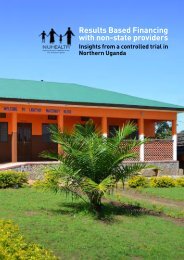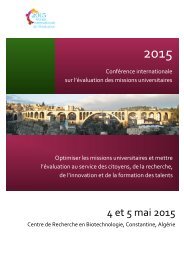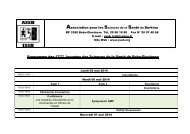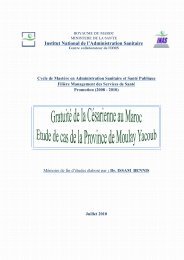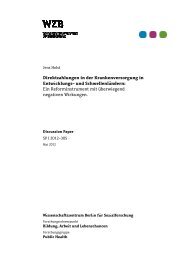Bellagio-Report-Vs-Apr-14
Bellagio-Report-Vs-Apr-14
Bellagio-Report-Vs-Apr-14
Create successful ePaper yourself
Turn your PDF publications into a flip-book with our unique Google optimized e-Paper software.
PAPER 3 - DEVELOPING AN ETHICAL COZY TRIANGLE -AFRICAN EVALUATION FOR PRIVATE, PUBLIC, PEOPLEDRIVEN DEVELOPMENTContributors - Debbie Serwadda, Doha Abdelhamid and Chiku MalunguWhat is African development? Prosperity, Human Dignity and PeaceWhy is it important? (THE STATEMENT)Current evaluation understanding and practice is still limited to specialists and consultants workinglargely in civil society and the public sector. Africa is a young continent full of untapped potentialespecially amongst young people and women. African Evaluation for Private, Public and People DrivenDevelopment therefore has the opportunity of contributing to developing young people and womenthrough applicable knowledge and local revenue generation, informed by a culture of innovation,enterprise, strategic leadership and accountability.Implications for evaluation theory and practiceWill it make a difference? YES• Current formal evaluation practice has a limited conceptualization of the scope of sustainabledevelopment.• Private, Public, and People Sector partnerships need to be strengthened• It is imperative to develop a more inclusive evaluation practice that evaluates itself and thataccommodates the already existing evaluation practices from all sectors (PPP)• There is an urgent need to raise the social consciousness of the private sector (formal andinformal) which reaches more people on the continent• The undisputed role of entrepreneurial Mindsets and practice as an engine and driver forsustainable development.• Evaluation as a means to an end promotes a culture of of ownership, responsibility, learning andaccountability• African evaluation is not the sole responsibility of specialists but a way of life of citizensHow can African Evaluation for Private, Public, and People Driven Development be madeinfluential? Who should be involved in the process?• It must utilize entrepreneurship and participation principles; indigenous knowledge, tools andpeople friendly methods.• It must be documented using people friendly methodologies and shared (using all technologiesincluding youth friendly ones) in a practical manner• It must be popularized and even documented in African languages to be read by Africansthemselves• All stakeholders must be involved from the 3 sectors• Mutually reinforcing roles across sectors must be clarified (enabler, implementers)• It must be comply with highest national and global standardsAfrican Thought Leaders Forum on Evaluation and Development, <strong>Bellagio</strong>, Nov 2012 50



